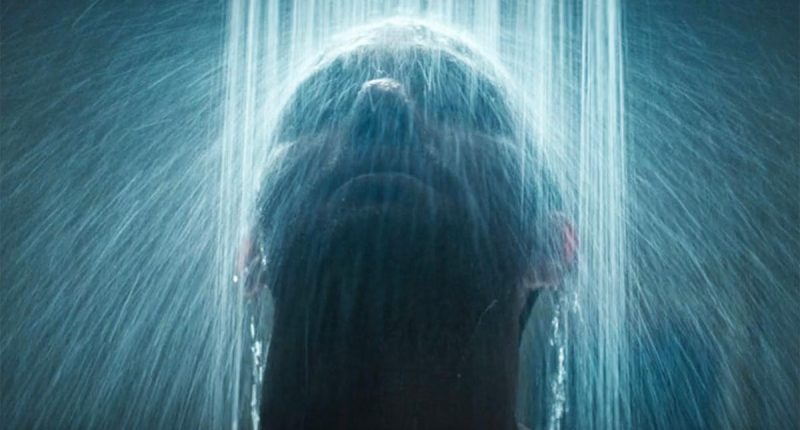It can be easy to look at the history of the Daredevil franchise on television through rose-colored, or red-tinted, glasses. The character’s Netflix series and its spinoff, The Punisher — a key credit on the resume of Born Again showrunner Dario Scardapane — are the best live-action projects in Marvel history, but they weren’t perfect. Due to the “Netflix bloat” phenomenon, an artifact of its time in which seasons that had eight or ten episodes’ worth of story in them were stretched out to 13 episodes come hell or high water, some episodes were bound to disappoint. These shows had a better hit/miss ratio than their Marvel/Netflix siblings, sure, but not every episode was a killer.
So it’s probably (hopefully) not the end of the world that this week’s installment was a mixed bag. The main negative is Muse, the serial-killing street artist whose storyline gets wrapped up in a hail of bullets fired by his would-be final victim — and therapist, unbeknownst to her until now — Dr. Heather Glenn. I get what the show was going for here: It’s a Manhunter situation, where a verbose murderer with delusions of grandeur turns on the one woman who cares about him until a heroic defender crashes through a window and puts a stop to it. All it’s missing is “In-A-Gadda-Da-Vida” on the soundtrack.

But Muse’s whole deal — he’s a graffiti artist and a skilled tae kwon do artist and a serial killer and a masked supervillain and an incel creep — is, like, a solid three or four deals too many for the character to hold together, even by the relatively generous standards of a superhero story. The less we say about the way Daredevil figures out Heather is in danger so he can arrive in time to save her, the better, but it does need to be said at least once: He uses his super-sense of touch to recognize her face from the brushstrokes on Muse’s obsessive portraits of her. It’s unrealistic enough that Mayor Fisk’s NYPD blackshirts have facial-recognition software that can connect his sketches to their subject; I’m just glad he wasn’t a cubist, or Heather would be dead meat.
But even the dead-end Muse storyline isn’t without its strong points. For one thing, he way he slices her forearm — up and down, not across, he means business — is extremely gnarly, honoring the storyline’s lineage of “murder basement” horror (to borrow a phrase from Angela Del Toro, who’s fortunately okay after her run-in with Muse) like Hostel and Saw. For another, I don’t think it’s any coincidence that he’s a filthy rich prep-school kid, slumming it as an artist while exploiting the city’s underclass, whom the police persecute but don’t protect. That’s pretty consistent with the politics of this show, which also sees the corrupt Mayor Fisk allow his NYPD goon squad to take credit for Muse’s takedown, writing Daredevil out of history entirely.

The episode is full of smart little details like that, raising the overall quality. Foremost among these is Michael Gandolfini’s performance as Daniel, who in one scene transforms himself from affable populist moron to malevolent fascist menace. Calling his pal BB Urich into a meeting in the Mayor’s office, he confronts her about burning him on the recycling/union-busting story and straight-up threatens her unless she runs the Fisk-approved version of the Muse story. He tells her her decision “will determine how totally awesome or totally shitty the rest of your life will be.” Then, grinning: “And I’d be so stoked if you made the right call! You know?” This guy is a born gangster.

So, of course, is Fisk. When he’s informed of Daredevil’s return, he rants and raves — you can tell because his voice gets more high-pitched than his usual gravelly growl — causing his advisor, Buck Cashman, to grow concerned.
“We’ve moved on from that now,” Buck says. “You’re the mayor now.”
“Yes,” Wilson replies. “I have more resources now. Institutional resources. Law enforcement resources.”
“Using those to settle old scores could be seen as an abuse of power,” Buck cautions.
Lol. Lmao. Rotflmao, even. Murderous right-wing politicians worrying about looking like they’re abusing their power to settle old scores. How quaint!

And they’re definitely murderous, by the way. In the episode’s final sequence — set in an Italian restaurant lit by director of photography Hillary Fyfe Spera in as effective a simulation of Gordon Willis gold as I’ve seen in a long time — Buck executes the boss of the Irish mob, whom Vanessa cannily determined was out to overthrow Wilson using herself as a proxy. The whole bit is soundtracked by “Please Stay” by the Cryin’ Shames, an eerie slice of early Northern Soul, an inspired choice that emulates the throwback sound of a Martin Scorsese gangster film without aping it outright. Why does this sequence whip as much ass as it does? No reason other than “because it can” that I can determine, but that’s reason enough.
Also there’s a Charlie Cox shower scene. Again, “because they can” is reason enough.

Sean T. Collins (@theseantcollins) writes about TV for Rolling Stone, Vulture, The New York Times, and anyplace that will have him, really. He and his family live on Long Island.







